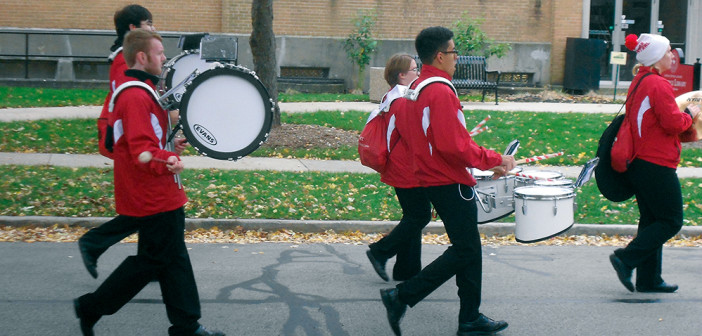The entertainment industry is famous for portraying common stereotypes to the extreme through the use of films and other media outlets such as music videos. Taylor Swift’s “You Belong With Me” video portrays an invisible, dorky, and sweet girl in the marching band competing for the high school football star’s affection against the popular, pretty, and snobby cheerleader.
Since stereotypes seem to be everywhere, there are programs that constantly discourage the formation of stereotypes and discourage the practice of putting people into tiny little boxes.
Labelling people through stereotypes can also make a particular group become a target for bullying. According to www.pacer.org/bullying about 1 in 3 students are bullied during the school year. The most common reasons for being bullied is not being fashion forward, not having the “correct” body shape, and race.
While the statistics themselves don’t reveal what the correct clothes, body, or ethnicity someone should be, it isn’t difficult to stretch the imagination to determine which kids and groups are targeted to bullying.
According to a study done by Leanna Closson, in which she studies the hierarchies of social status both inside and outside of particular groups, the popular kids, the kids which are well-liked and well-dressed, are more likely to use relational aggression — ruining someone’s social status and relationships — to make sure the kids that don’t fit into the common mold stay on the bottom of the social status.
However, even though the evidence says otherwise, being part of a stereotype may not be so bad. For example, being labeled as a jock or band geek can be beneficial.
“I’d say externally if you’re not in those groups it would be a negative stereotype,” said freshman Wendy Myers, who plays mellophone in the Cardinal Athletic Band, “(But) I think in having a label we’re equally accepted into the folds of a group. It’s easier to fit into a band geek clique if you speak the language.”
According to a study published in the Merrill-Palmer Quarterly in 2009, those who find themselves in cliques and stereotypical groups are part of a group of people with similar interests and behavior.
“You get to be part of a group, you act as a team, you get to hang out with them, you create friends. With football you form a brotherhood, a band of brothers almost,” said junior Patrick Bolger, who plays football at North Central.
Being labeled under a certain stereotype can be harmful, when it leads to bullying and other negative things, but in general it seems people may not really mind being labelled as long as they agree with it.
For example going to Google and typing in stereotypes about jocks or band geeks, some of the results that pop will be quizzes that can be taken to find out what stereotype you fit into.
In the comments’ sections these types of reactions can be found:
“Band Geeks forever!!!!”
“Class clown for the win”
“30 years later and I’m still a juvenile delinquent!!!”
Perhaps the humor and fun of taking a quiz makes being labeled ok. If people are willingly subjecting themselves to be put into a particular group, then the negativity of that group disappears. Or perhaps as people age the negativity of being labelled type doesn’t matter.
“When you’re concerned with your image, negative views would be more elevated,” said senior Gina Lea, who plays clarinet in Concert Winds. “By the time you’re in college people are more easygoing. People are less concerned about image. I don’t care. It doesn’t affect people our age anymore.”
It also seems to help that once people reach high school, there are more people and groups to interact with. In the 1990s, a study done by David Kinney was conducted to see if students who were labeled as nerds in middle school were still considered to be nerds in high school.
Kinney found that students who had been labeled as nerds, and bullied because of it, were much happier in high school. Once they reached high school there were many more opportunities to get involved in different activities and find a group of people who were supportive.
“In middle school I played in the band but I didn’t really want to so I was forced into it. As soon as I quit I kind of characterized those people as band geeks, but as I moved to high school I started not calling them that,” said Bolger.
I definitely think that as time goes on through middle school through college these stereotypes start to melt away. We start to act like everyone is the same whether they are in band or on a team,” he said.
Even when people make negative remarks towards a group, as people grow older the responses to those remarks show that people become proud of the identity despite any possible negative connotation.
For example when sports radio talk show host Jim Rome tweeted “Is there anyone not in a marching band who thinks those dorks running around with their instruments are cool?” some of the responses didn’t shame him for his nasty remark, but instead showed how those “dorks” were proud of being in a marching band.
The most popular response being made by the Army which tweeted “Just ‘running around with our instruments,’ and serving our country. #ProudtobeinBand #romeisburning #MarchOnRome.”
“I think part of the fun of being in a group is that you can make fun of that group,” said Myers, “I think one of the best parts of being a band geek is that we can make fun of ourselves.”
By the end of Swift’s video the dorky unpopular girl gets the guy at the school dance, and while she looks a little nicer than earlier in the video she is still the same sweet and innocent girl. She doesn’t change who she is to fit; instead she’s accepted for who she is.

